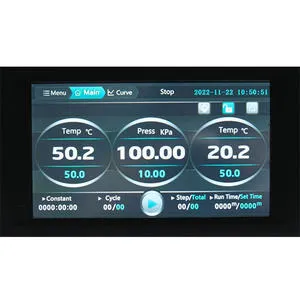Temperature is one of the important environmental factors affecting livestock and poultry production performance. Suitable temperature conditions are beneficial to the growth, development and reproduction of livestock and poultry, while temperatures that are too high or too low will have adverse effects on the health and production performance of livestock and poultry. Therefore, temperature control in farms is crucial.

The impact of temperature on livestock and poultry production performance is mainly reflected in the following aspects:
Growth and development: Appropriate temperature conditions are conducive to the growth and development of livestock and poultry. Too high a temperature will inhibit the appetite of livestock and poultry and reduce their growth rate; too low a temperature will also cause the growth of livestock and poultry to be retarded and even cause death.
Reproductive performance: Appropriate temperature conditions are conducive to the reproduction of livestock and poultry. Too high a temperature will inhibit the sexual desire of livestock and poultry and reduce their pregnancy rate; too low a temperature can also cause reproductive disorders in livestock and poultry, and even infertility.
Egg-laying performance: Appropriate temperature conditions are beneficial to the egg-laying performance of livestock and poultry. Excessively high temperatures will reduce the egg production rate of livestock and poultry, and even cause production to stop; too low temperatures will also lead to a decrease in the egg production rate of livestock and poultry.
Meat quality: Appropriate temperature conditions are conducive to improving the meat quality of livestock and poultry. Excessively high temperatures will cause the meat of livestock and poultry to be rough and have poor flavor; too low temperatures will also cause the meat of livestock and poultry to become hard and have a poor taste.
In order to control the temperature of the farm, the following measures can be taken:
Architectural design: The architectural design of the farm should fully consider the local climate conditions and take corresponding insulation measures. For example, in cold regions, the walls and roofs of farms should be constructed with insulating materials to prevent heat loss.
Ventilation system: The farm should install a ventilation system to maintain air circulation, discharge harmful gases, and regulate temperature. The design of the ventilation system should be based on the specific conditions of the farm.
Heating system: In cold areas, farms should install heating systems to increase room temperature and ensure the comfort of livestock and poultry. The design of the heating system should be based on the specific conditions of the farm.
Cooling system: In hot areas, farms should install a cooling system to lower the room temperature and ensure the comfort of livestock and poultry. The design of the cooling system should be based on the specific conditions of the farm.
In general, temperature is one of the important environmental factors affecting livestock and poultry production performance. Appropriate temperature conditions are beneficial to the growth and development, reproduction, egg production and meat quality of livestock and poultry. Therefore, temperature control in farms is crucial. Farms can control temperature through building design, ventilation systems, heating systems, and Intelligent Temperature Controllers to ensure the health and performance of livestock and poultry.